Archaeological Institute of America
Deadline: February 1, 2025
The Felicia A. Holton Book Award is given annually to a writer who, through a major work of non-fiction, represents the importance and excitement of archaeology to the general public. The work should have broad public appeal and be written for an adult lay audience in a clear and engaging style. It should convey the excitement of archaeological discovery accurately and responsibly. It should be well-researched and provide new insight for the general public. This is a jointly sponsored award of the AIA and the Center for American Archeology (CAA).
Submissions (by authors, publishers, or AIA members) should focus on archaeology but may also delve into literary and historical topics. The work must have been published in English, be available in the United States and Canada, and bear a date of publication within three calendar years prior to (not including) the year in which the book is considered for an award. No nominated book may be resubmitted for the Holton Award unless requested by the Holton Book Award Committee. From time to time the Holton Award may be given for lifetime achievement in non-fiction popular writing. Books written by current members of the Governing Board of the AIA, the CAA or of the Committee are not eligible.
Authors and publishers may bring their books to the Committee’s attention by filling out the Nomination Form. The Nomination Form should address how the book nominated fulfills the guidelines. AIA members are also encouraged to suggest books worthy of the award by filling out the Nomination Form. Books may be submitted for the award only once, and should not be re-submitted unless specifically requested by the Committee.
Notifications Procedure
The committee will review nominations and make a decision by October. This decision then needs to be approved by the AIA’s Governing Board. In November, AIA Staff will contact all nominators regarding the status of their nomination. The winner will be celebrated at the Awards Ceremony in January.
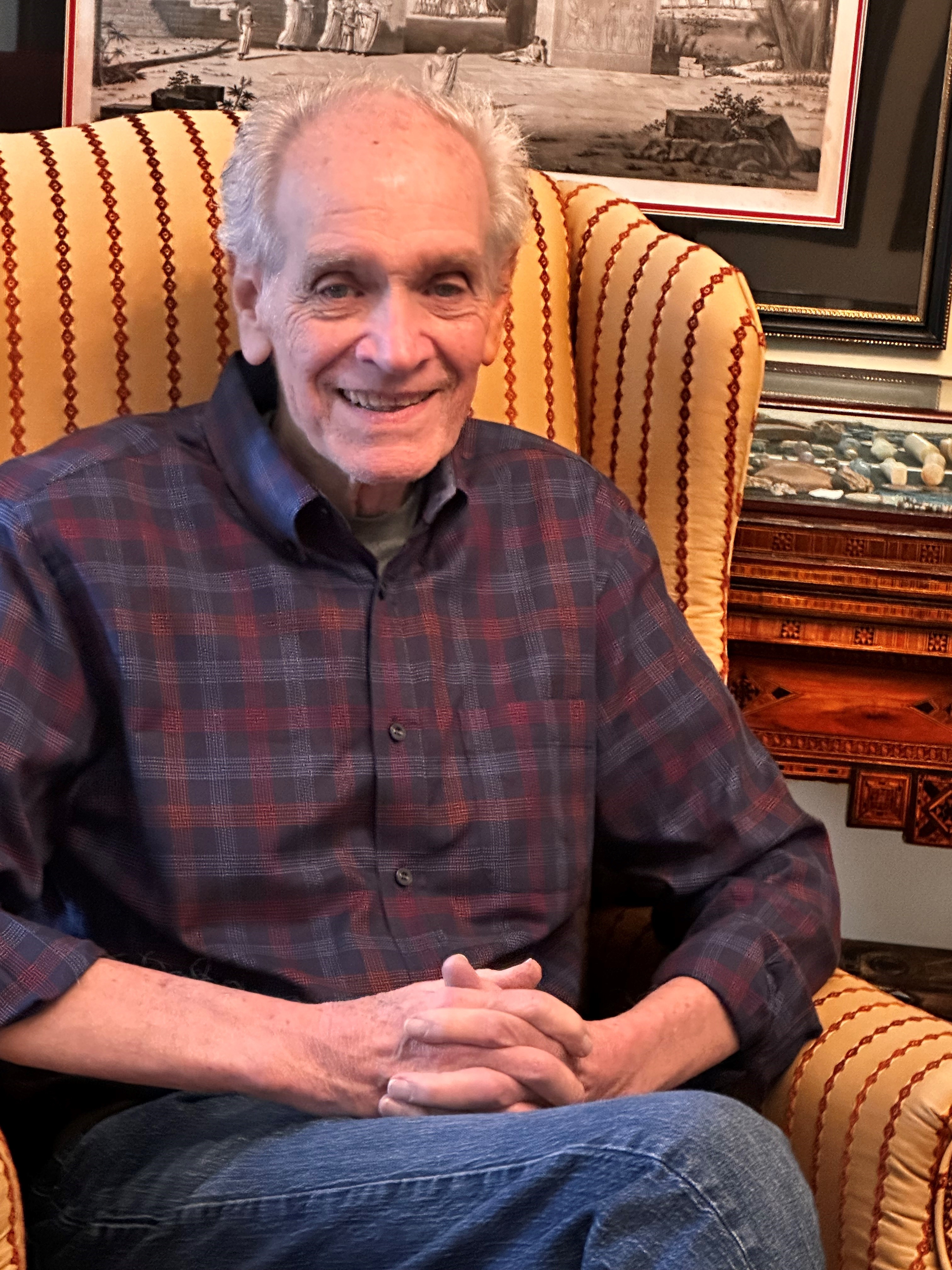
2025
The Archaeological Institute of America and the Center for American Archeology are pleased to present the 2025 Felicia A. Holton Book Award to Bob Brier for his book Tutankhamun and the Tomb that Changed the World, published by Oxford University Press in 2022. Dr. Brier is an Egyptologist specializing in paleopathology whose writing focuses on the history and archaeology of ancient Egypt. He is the author of four other books and a large number of articles.
Tutankhamun and the Tomb That Changed the World briskly takes readers through all aspects of the tomb of Tutankhamun, from the convoluted history of its discovery to the research about the tomb since its discovery, and finally to the impact of the discovery for Egyptian politics and global popular culture. The core of the book is a detailed discussion of much of the material culture of the tomb’s content: not only the body of the pharaoh himself, but also his chariots, shoes, daggers, sarcophagus, and more. We learn, for example, that analysis of Tutankhamun’s iron dagger showed a nickel content of about 11 percent, suggesting that the dagger was made of meteoric iron, and indeed that two other meteoritic objects were buried with the body. Howard Carter’s practice tells us a great deal about the history of archaeology, from his assembly of a multidisciplinary team and the pioneering use of photography, to the theft of objects from the tomb by Carter, revealed through private correspondence between Carter and Alan Gardiner. The book thus focuses on all major aspects of archaeology: its history, its practice, especially the analysis of finds, and its politics.
Although the goals of this book are monumental, given the richness of the material and Tutankhamun’s manifest significance, the prose is so engaging and the figures so well chosen that the reader never feels bogged down by the enormous quantity of material being communicated. Indeed, multiple members of the Holton Book Award Committee found that Brier’s book was so well written and the material so captivating that the book was hard to put down. It thus admirably fulfills the Holton Award’s goal to recognize a writer who “represents the importance and excitement of archaeology to the general public.”
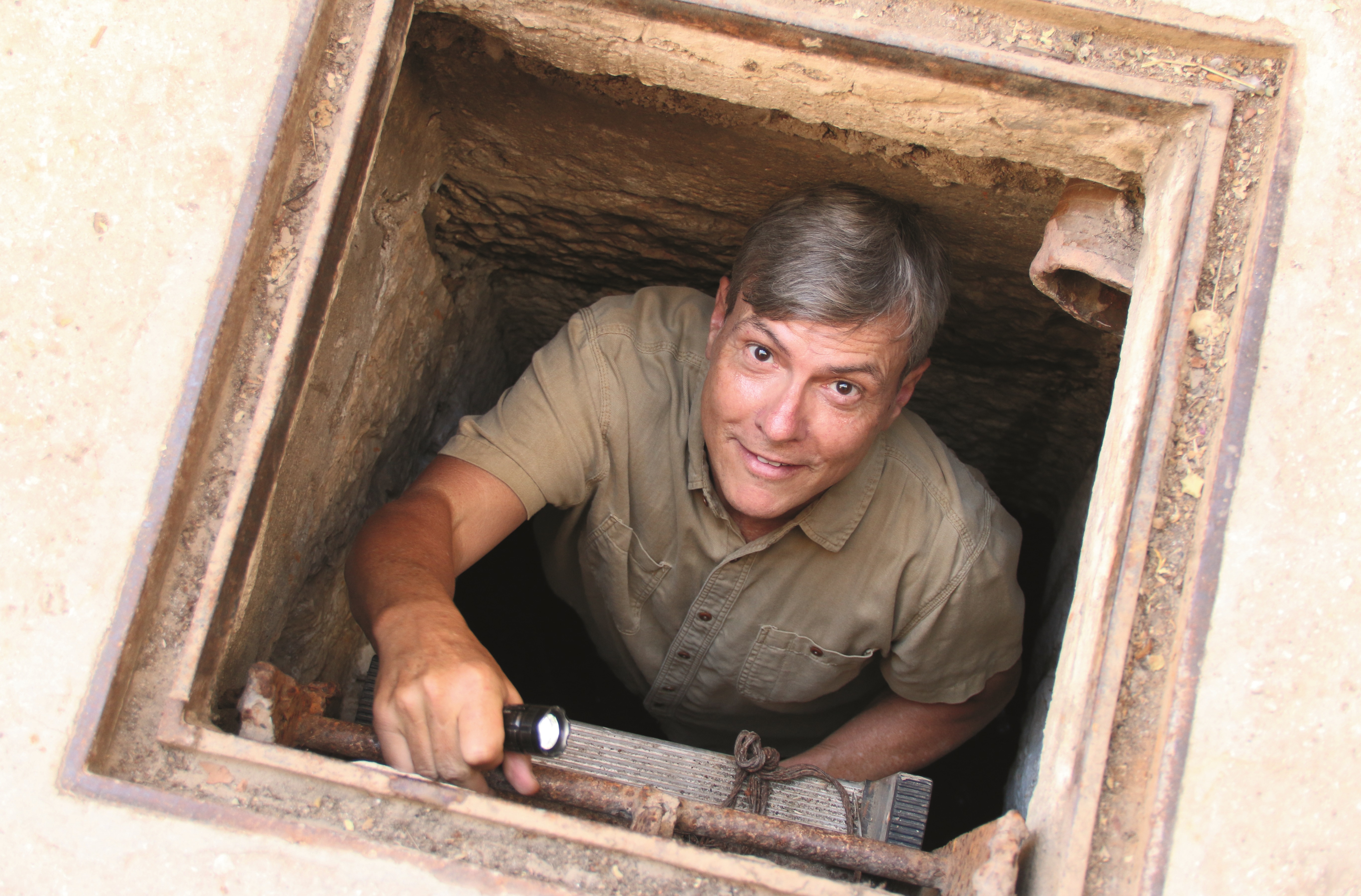
2024
The Archaeological Institute of America and the Center for American Archeology are pleased to present the 2024 Felicia A. Holton Book Award to Mr. Andrew Lawler for his book Under Jerusalem: The Buried History of the World’s Most Contested City, published by Doubleday in 2021.
Under Jerusalem takes its readers through the history of Jerusalem’s material past, from the mid-19th century to the present day. As one might expect, this is a monumental task, not only because of the extent of this material, but also for the sensitivity required to tell these stories. Jerusalem is perhaps one of the most ‘archaeological’ places in the world, and Mr. Lawler dives deep into the evidence, telling these difficult and important stories clearly and soberly, letting the reader decide for themselves how best to understand the events in question. Consequently, this book is one that should stimulate productive debate among its readers, especially as regards the ethical, moral, and political stakes of archaeology, the way that archaeology has been used as a tool for imperial and colonial powers, and the clear stakes of archaeology’s impact on the modern world.
This book provokes debate about the nature of archaeology, its past and its future, and how to tell its story in Jerusalem, all questions of interest to members of the greater archaeological community. Under Jerusalem tells difficult and even heartbreaking stories, but they are also the ones that we need to hear in order to think through the power of the past, the harm that it has done, and the possibilities for it to be a force for good in the world.
Mr. Lawler’s skillful use of prose has made the book extremely engaging and enjoyable to read. This book provokes debate about the nature of archaeology, its past and its future, and how to tell its story in Jerusalem, all questions of interest to members of the greater archaeological community.
This book presents an invaluable and endlessly thought-provoking resource which will undoubtably be used for decades to come and for this reason the Archaeological Institute of America is pleased to recognize Mr. Andrew Lawler with the 2024 Felicia A. Holton Book Award.
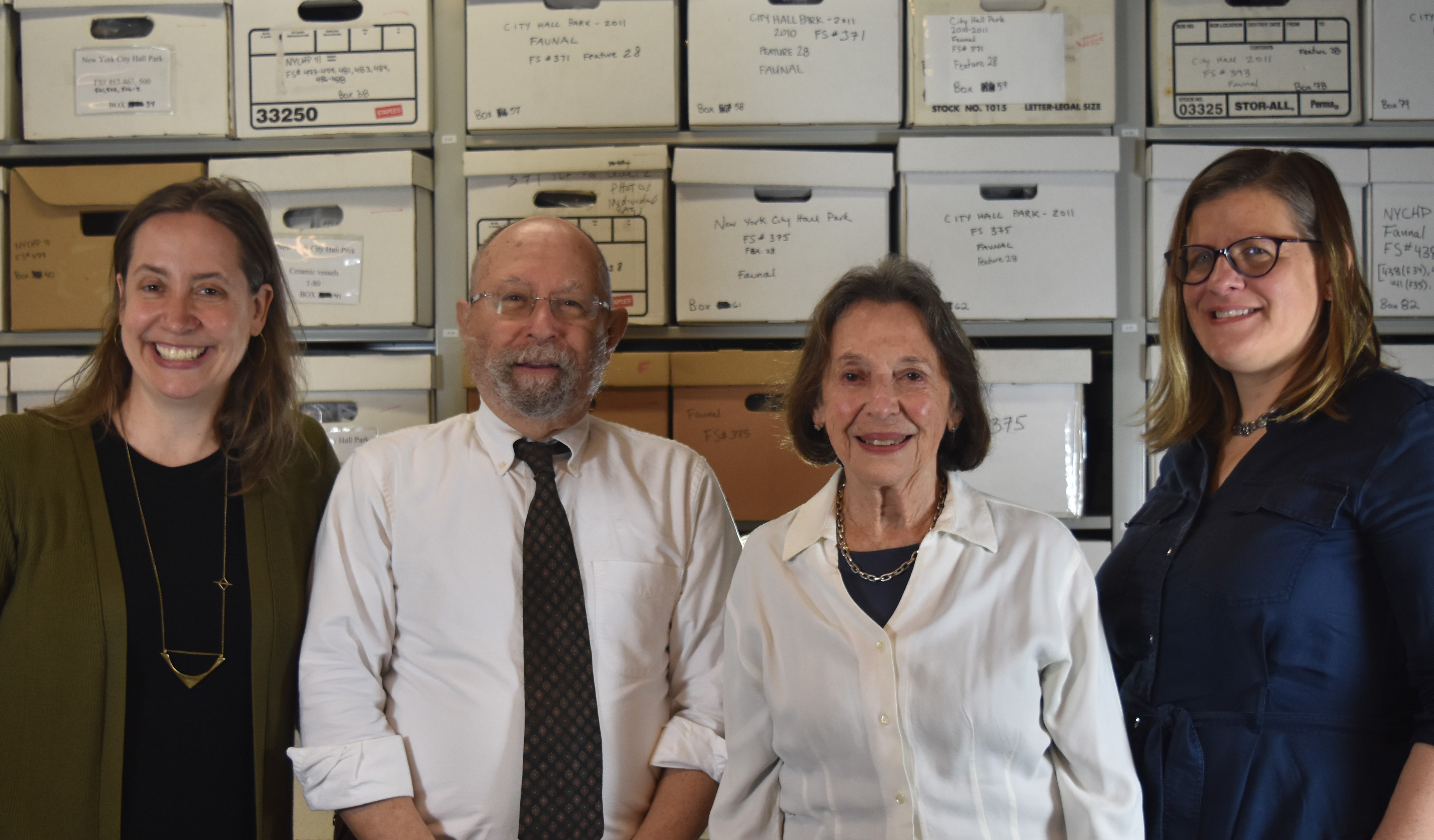
2024
The Archaeological Institute of America and the Center for American Archeology are pleased to present an Honorable Mention for the 2024 Felicia A. Holton Book Award to Dr. Nan A. Rothschild, Ms. Amanda Sutphin, Dr. H. Arthur Bankoff, and Dr. Jessica Striebel MacLean for their book Buried Beneath the City: An Archaeological History of New York, published by Columbia University Press in 2022.
Their book is an archaeological history of New York City, beginning from the 12th millennium BCE and continuing to the end of the 19th century CE. Despite its tight focus on the five boroughs, it does a remarkable job treating a wide range of themes, demonstrating the great power of prehistoric and historical archaeology to produce rich and textured narratives. It admirably educates its readers about archaeological methods and what archaeologists do, and it makes excellent use of lavish color illustrations (with explanatory image captions).
The Felicia A. Holton Book Award Committee congratulates the authors of Buried Beneath the City for their achievement and hopes that their work encourages archaeologists to produce more such books. The Archaeological Institute of America is pleased to recognize Dr. Rothschild, Ms. Sutphin, Dr. Bankoff, and Dr. MacLean with a 2024 Felicia A. Holton Book Award Honorable Mention.
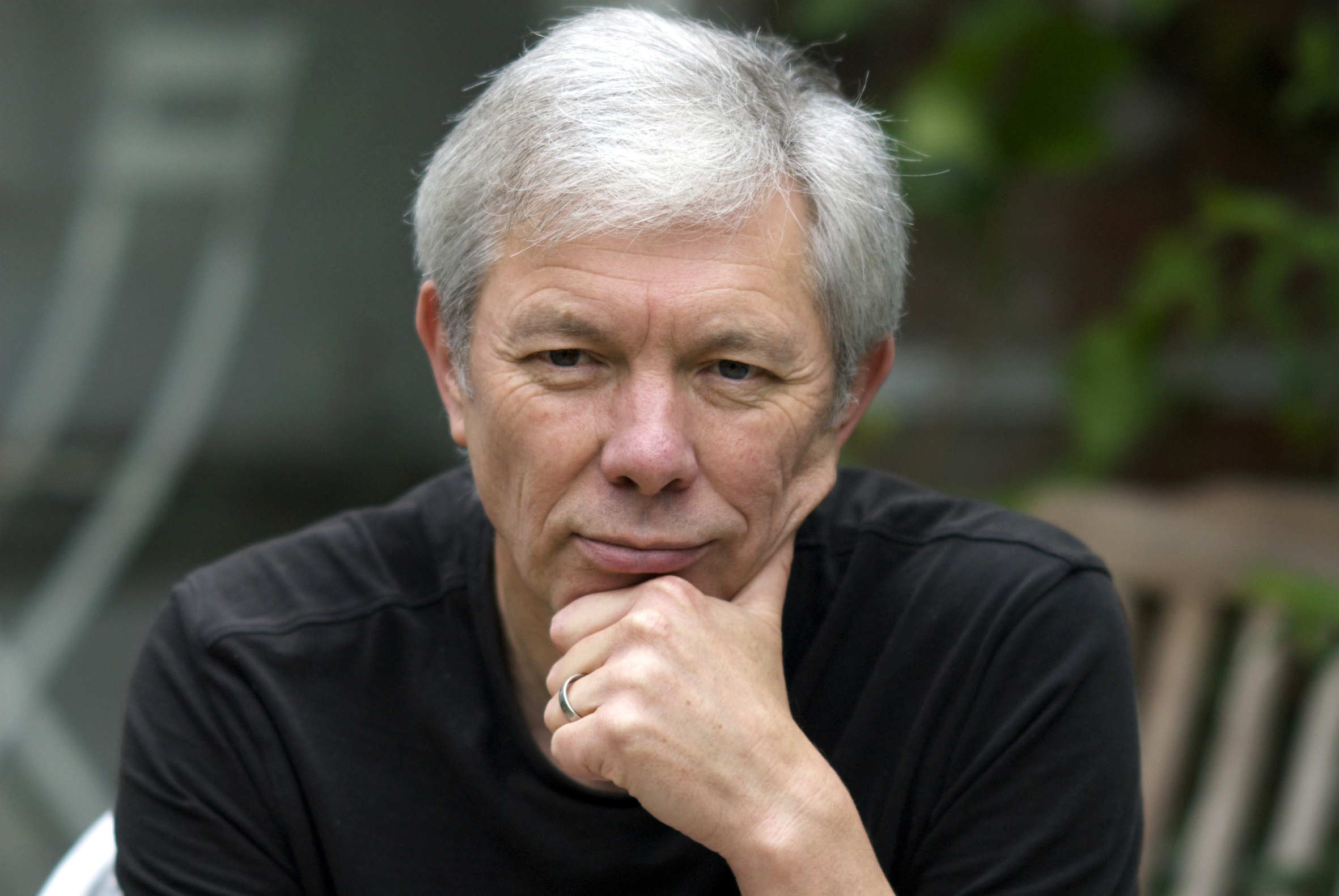
2023
The Archaeological Institute of America and the Center for American Archeology are pleased to present the 2023 Felicia A. Holton Book Award for a major work of nonfiction written for the general public to Mike Pitts for his book Digging Up Britain: Ten Discoveries, a Million Years of History (Thames & Hudson, 2019).
Digging Up Britain is a brisk introduction to what archaeology can contribute to the history of Britain. The book zooms in on ten archaeological sites across Britain, beginning with a massacre of fifty-two individuals, almost certainly Danish Vikings, at Weymouth in Dorset. Readers are guided backward in time with each successive chapter, mimicking the way that archaeological strata are excavated—last in, first out—until they reach the earliest evidence for the human occupation nearly one million years ago. Pitts moves with great ease across a wide variety of sites: the reader is introduced to Bronze Age houses and grave pits, to Roman cities and Palaeolithic caves, to megalithic Stonehenge and Medieval hoards of treasure. This deep and varied history allows Pitts to discern long-term patterns, such as Britain’s sustained close contacts with the continent, not just with large-scale engagements but also with small-scale movements of people and shared cultural ways of doing things across vast distances. Thus, the book also touches on the meaning of archaeology to the present day. What matters are both “the stories buried beneath our feet” – the local stories that we can tell from the archaeological record – as well as the shared complex of cultural practices that stretch back to the origins of humanity.
The Committee was impressed with the book’s ability to move easily between the details of an archaeological excavation and broader historical narratives, as well as with its effective use of figures, including over twenty stunning images in color. Digging Up Britain embraces the stories that archaeology can tell about the deep human past, providing the reader with clear and compelling narratives without losing sight of the complexity of the archaeological record and the intellectual nuance required to interpret it. For these reasons and more, Mike Pitts’ Digging Up Britain: Ten Discoveries, a Million Years of History is a most deserving recipient of the 2023 Felicia A. Holton Book Award.
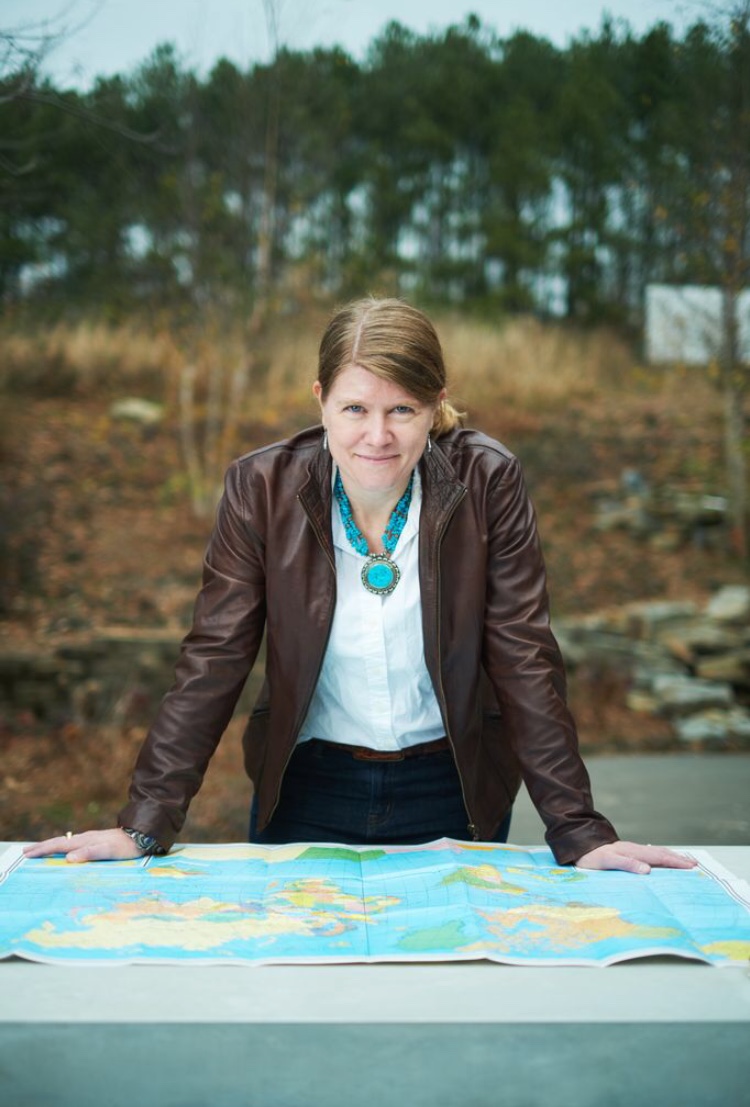
2022
The Archaeological Institute of America and the Center for American Archeology are pleased to present the 2022 Felicia A. Holton Book Award for a major work of nonfiction written for the general public to Dr. Sarah Parcak for her book Archaeology from Space: How the Future Shapes Our Past (Henry Holt and Co., 2019).
Archaeology from Space is a lively and personal introduction to the field of archaeology from space. It shows us how satellite imagery and remote sensing can help us do better archaeology and improve our understanding of the human past. Dr. Parcak enlivens discussion of archaeological methodology through a compilation of the “greatest hits” of her young but impressive career thus far as a field archaeologist. The reader travels with the author from the sites of Tanis and Lisht in the Nile delta to Point Rosee on the Atlantic coast of Canada to the Cañete valley in southern Peru. She clearly lays out how satellite imagery enhances and complements tried and true archaeological field methods like field survey and excavation. She also illustrates vividly how it can be used as a tool to combat looting, a formidable and ubiquitous problem faced worldwide.
Dr. Parcak’s book also brings to life the heterogeneity of archaeological practices and approaches. It blends the hard science of archaeological methods with the art of its interpretation. As with the best archaeological work, it is this combination of technical brilliance and scientific data with personal experience and humanistic learning, and even imaginative reconstruction, that makes her book so compelling. This skilled analysis is not an end in itself but yields an appreciation of the broad scope of human history and sheds light on the remarkable lives led by regular people.
Archaeology from Space is a rare book in that it expertly combines engaging narratives and vibrant prose with scholarly content. Most of all, it does a remarkable job at informing its reader about the modern state of archaeology while providing a thrilling glimpse at the field’s future. For these reasons and more, Dr. Parcak’s Archaeology from Space is a most deserving recipient of the 2022 Felicia A. Holton Book Award.

2021
The Archaeological Institute of America and the Center for American Archeology are pleased to present the 2021 Felicia A. Holton Book Award for a major work of nonfiction written for the general public to Dr. Peter Bogucki for his book The Barbarians: Lost Civilizations (Reaktion Books, 2017).
Dr. Bogucki’s book examines the archaeological evidence for the communities of Europe north of the Alps from 2000 BC to AD 500. Although these communities did not develop the same hierarchies or textual cultures that the Mediterranean did, and were thus considered ‘barbarians’ by their neighbors to the south, they were innovative, complex, and (importantly to the reader) endlessly fascinating. The Barbarians focuses its attention on “luminous regions”: places dense with monumental and rich sites that played critical roles in the development of European prehistory. This selective approach allows Dr. Bogucki to engage his readers in a brisk and lively account while giving them real insight into the archaeological highlights that reveal the meaningful dimensions of, or raise important questions about, the societies in question. The book’s focus on archaeology provides an important and useful counter-narrative to our usual accounts, which are typically focalized through Greek and Roman eyes and written sources.
The Barbarians is attractively written, empirically rich, and true to the archaeological record. It provides evidence, if any was needed at this point, that rich and textured accounts can be written from material culture in the absence of texts. It is a model of the genre that the Felicia A. Holton Book Award honors and is richly deserving of a broad and appreciative audience.

2020
The Archaeological Institute of America and the Center for American Archeology are pleased to present the 2020 Felicia A. Holton Book Award for a major work of nonfiction written for the general public to Dr. Billy Griffiths, for his book Deep Time Dreaming: Uncovering Ancient Australia (Black Inc. Books, 2018).
Dr. Griffiths’ book lays out the history of Australian archaeology, tracing the shifts in the way that it has been understood. It deals with the material evidence directly through the eyes of archaeologists, and vividly illustrates how deep the indigenous history of Australia is. Dr. Griffiths also shows how important that past is to public discourse through an examination of the relationships between Australian archaeologists and specific Aboriginal communities, as well as the dynamics between archaeologists and other stakeholders. The book is thus a salutary reminder of the dual nature of archaeology as an empirical and scientific discipline on the one hand, and an activity with political and social implications on the other.
Deep Time Dreaming brings not only the archaeological process to light, but also illustrates how and why that process, if it is done conscientiously and rigorously, matters outside of the discipline to a broad cross-section of communities. It is a splendid example of the type of book the Felicia A. Holton Book Award is meant to celebrate.

2019
The Archaeological Institute of America and the Center for American Archeology are pleased to present the 2019 Felicia A. Holton Book Award, for a major work of nonfiction written for the general public, to Timothy Matney and his project team for their book “Ziyaret Tepe: Exploring the Anatolian frontier of the Assyrian Empire” (Cornucopia Books, 2017).
This book is an in-depth, detailed look at field archaeology during the eighteen years of excavations in Turkey led by Professor Matney that ran from 1997 to 2014. Day to day operations, the interpretation and evaluation of finds, conservation and presentation are all covered, with many striking photos to support the narrative. It brings the daily work of this extended, multi-year dig to vivid life for general readers in a way that genuinely excites an interest in archaeology.
This citation also acknowledges Professor Matney’s three co-authors, John MacGinnis, Dirk Wicke and Kemalettin Köroğlu, along with the contributions from the rest of the project team over the life of the dig.
It is a pleasure to recognize Ziyaret Tepe as the worthy recipient of the 2019 Felicia A. Holton Book Award.
2018
2017
2016
2015
2014
2013
Lifetime Achievement
2012
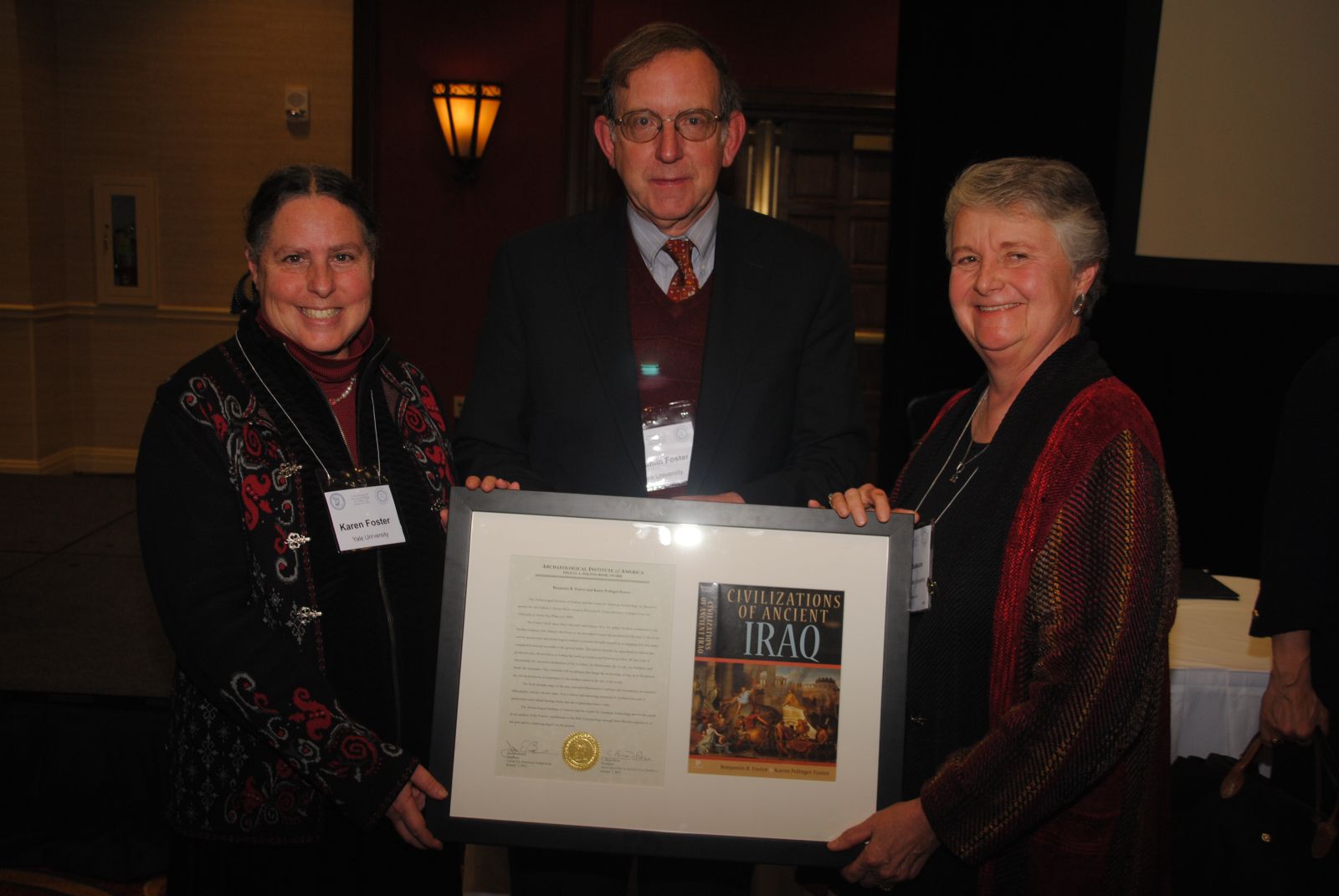
2011 winner
The Archaeological Institute of America and the Center for American Archeology are pleased to present the first Felicia A. Holton Book Award to Benjamin R. Foster and Karen Polinger Foster for Civilizations of Ancient Iraq (Princeton 2009).
The Fosters’ book traces Iraq’s rich and varied history from the earliest Neolithic settlements to the Muslim conquest, with chapters that focus on the individual cultures that prospered in this area. It effectively weaves ancient texts and archaeological artifacts to present scholarly research in an engaging style that makes complicated material accessible to the general public. The authors describe the agricultural revolution that produced cities, the invention of writing that made governance and literature possible, the law Code of Hammurabi, the successive domination of the Assyrians, the Babylonians, the Greeks, the Parthians, and finally the Sassanians. They conclude with an epilogue that brings the archaeology of Iraq up to the present day and demonstrates its importance to the modern nation to the rest of the world.
The book includes maps of the area, annotated illustrations of artifacts and monuments, an extensive bibliography, and an effective index. It is a concise and interesting treatment of a political area and of preservation and cultural heritage issues that are of great importance today.
The Archaeological Institute of America and the Center for American Archeology present this award in recognition of the Fosters’ contribution to the field of archaeology through their effective exploration of the past and its continuing impact on the present.
2011 honorable mention
The Archaeological Institute of America and the Center for American Archeology are pleased give an Honorable Mention in the 2011 Felicia A. Holton Book Award to Patrick E. McGovern for Uncorking the Past: The Quest for Wine, Beer and Other Alcoholic Beverages (Berkeley 2009).
McGovern’s book takes the reader on a worldwide tour through the millennia in search of the origins of fermented beverages. At a Neolithic site in China, McGovern analyzes the residue in ancient pottery jars to find a grog dating back to 7000 B.C.E. In Iran, he discovers the first evidence of wine from grapes and recognizes jars used to make barley beer ca. 3500 B.C.E. His exploration takes him along the Silk Road, to Europe, to Africa, and to the New World.
McGovern combines archaeological, chemical, textual, and artistic data to elucidate the universal allure of alcoholic beverages. He posits that cereals were domesticated for their alcoholic potential as well as for use as a food staple.
The Archaeological Institute of America and Center for American Archeology award an Honorable Mention in recognition of McGovern’s use of scientific techniques to extract new information and thereby to enhance our understanding of human history.
Notifications